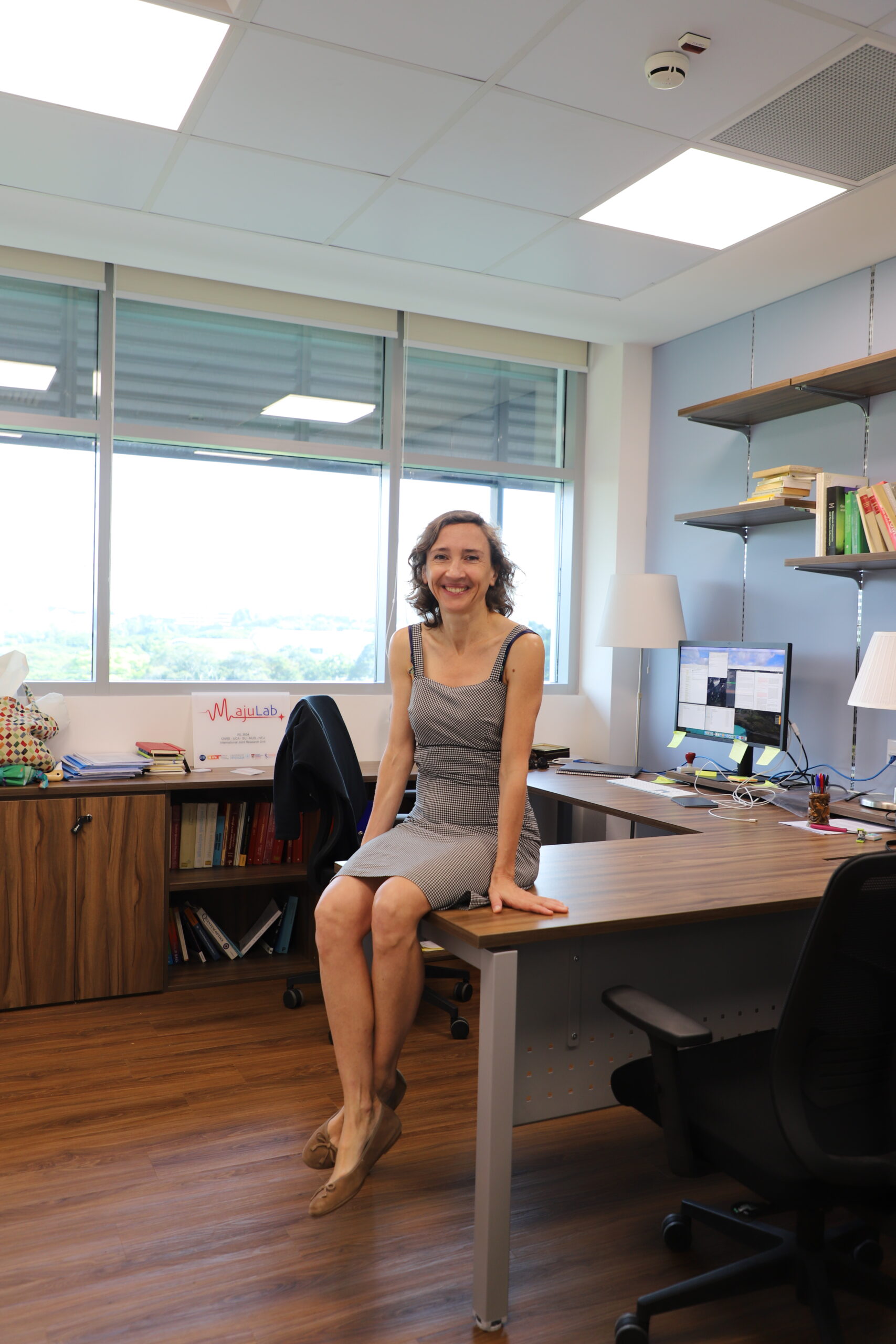Rethinking Energy in the Quantum Age
Interview with Dr. Alexia Auffèves, French physicist, pioneer of quantum energetics, and co-founder of the Quantum Energy Initiative (QEI).
Quantum physics has been the star of the tech world for almost a century now. However, a second quantum revolution is quietly emerging, shaking up the very foundations of how computers work at every level, from the principles behind the information itself and how the machines physically process it, to the algorithms. These new quantum technologies promise exceptionally faster computations and more secure communications.
As governments and industries invest heavily in quantum systems, it’s time to think about how we build and use them responsibly. That means not just focusing on what they can do but also on how much energy they use to accomplish tasks. Environmental and societal challenges recognized nowadays impose new constraints that were not obvious when classical computers first emerged. Early signs from quantum processors show lower energy consumption compared to traditional machines, but we don’t fully understand why and whether this advantage will persist as they scale.
In a seminal paper published on Physics Review X Quantum, in 2022, physicist Dr. Alexia Auffèves, First Class Research Director at CNRS in France, head of the International Research Lab MajuLab and invited Professor at the Centre for Quantum Technologies of Singapore argues that “a strong link between fundamental research and engineering is necessary to establish quantitative connections between quantum-level computing performance and energy consumption at the macroscopic, full-stack level.” In the framework of the International Year of Quantum Science and Technology, we had a conversation with Dr. Alexia Auffèves about her work as a pioneer of quantum energetics and as a co-founder and leader of the Quantum Energy Initiative (QEI) —an interdisciplinary effort that brings together experts in quantum physics, thermodynamics and energetics, computer science, and engineering aiming to understand how quantum technologies use energy from the ground up.
“I have been working in quantum thermodynamics for twelve years now, and at the beginning the impact of this research for quantum technologies was not easy to spot. The community of quantum thermodynamics was barely involved when the big takeoff in quantum technologies took place. I was part of the quantum thermodynamics community, but also had a vision of what was going on with quantum technologies because of my past as an experimentalist, and because I was running the Grenoble center for quantum technologies. So, I saw that there was clearly a gap to bridge between the two communities,” Alexia says.
Drawing lessons both from the history of classical computing and the recent developments in artificial intelligence, Auffèves reminds us that energy efficiency does not happen by accident: If you don’t search for it, you won’t find it. In the case of quantum computing, it may require decades of refinement, from understanding fundamental principles connecting energy cost and performance, to designing chips that balance performance with power consumption.
Creating an international research community to understand the energetic footprint of emerging quantum technologies
Motivated by the timeliness and relevancy of addressing the energy cost of quantum technologies, Alexia, her colleagues Robert Whitney and Janine Splettstoesser, and consultant and author Olivier Ezratty co-founded the Quantum Energy Initiative (QEI) in 2022.
That means establishing ways to measure energy efficiency in quantum devices, setting benchmarks, and identifying how to reduce energy consumption across different quantum platforms and computing paradigms. Quantum computing would be addressed first, but communication, and sensing, the two other so-called pillars of quantum technologies, would be investigated as well. The QEI team aims to define what “energy quantum advantage” really means in scientific terms and use that knowledge to guide smart design choices as quantum systems develop.
“The QEI is one of the first attempts to develop innovation in a finite world. In the past, innovators used to invest lots of money, hoping that something would come out. Now, we have to take into account the fact that the physical resources, especially energy, are finite. In that sense, quantum computing is growing in very, very different conditions than its older sister, classical computing, when there was oil all over the place, and so you could develop technologies presuming that we have infinite resources.”
But launching such initiatives, where fundamental science and emerging technologies intersect, also means navigating the influence of industry sectors, which often seek to align themselves with the prevailing ethical narratives of the time.
“When you launch an initiative like this, you are not really aware of the kind of forces it is going to trigger, especially nowadays, where there is a lot of quantum hype. If you mix this hype with the word “energy”, then it can quickly become unbearable. The QEI is not a greenwashing company. We are here precisely to prevent greenwashing. We are here to provide the community with objective scientific figures of merit so that sentences like: “Oh! My quantum computer will compute with less energy.” can be checked, and the energy efficiency of this very computer can even be compared to a fundamental bound and improved over time.
Can we build a theory that captures the quantum and the classical altogether?
To understand the true energy cost of quantum computing, we must look beyond hardware specifications and operational efficiency. At the heart of the challenge lies a much deeper, more conceptual problem: how to capture the quantum and classical worlds within a single physical model. This isn’t just a technical hurdle—it’s the oldest and still open problem of quantum physics, known as the measurement problem.
Any computation—whether classical or quantum—can be broken down into three stages: input, processing, and output. In quantum computing, both the input and the computational process involve inherently quantum phenomena such as superposition and entanglement. However, obtaining the result (the output) requires a measurement, a process that plays a central role in our understanding of quantum mechanics. Scientists remain puzzled by what exactly occurs during measurement, when quantum properties are seemingly lost as the quantum system interacts with the classical apparatus used to observe it.
“If you think about a quantum computer, while the computation is being performed, we deal with Schrödinger’s cat states, i.e. superpositions of states of “macroscopic” systems – here, data registers made of large numbers of qubits. So, there you have Schrödinger’s cat states in a box (a cryostat, for instance) that you are trying to control from the external [classical] world. And my feeling is that the truly fundamental energy cost of quantum computing is actually the cost of the box surrounding the Schrödinger’s cat.
Answering that question is hardware-independent and would also be a way to solve one of the biggest open questions of quantum physics: can we build a theory capturing the quantum and the classical altogether?
Nowadays, this question belongs to the field of quantum foundations, which is largely decoupled from quantum technologies where ‘Shut up and calculate’ [the answer usually given by engineers and academics to people wondering on the philosophical meaning of quantum theory] has been proven an efficient strategy; However, if you really want to calculate minimum energy costs and get a universal framework to benchmark all possible quantum platforms, solving that fundamental problem is highly relevant. This is a beautiful example of how the answer to foundational issues can be triggered by technological questions, just like the thermodynamic arrow of time came out from the optimization of heat engines,” Dr. Auffèves enthusiastically explains.
Quantum energetics at the forefront of the fundamentals of quantum physics itself
Peeling back the layers of abstraction to understand what’s really happening inside a quantum computer is foundational to asking deep questions about the nature of energy, noise, and computation at the quantum level. Alexia reflects on how her investigation offers a window into that philosophical and scientific inquiry, one that challenges us to rethink what “energy cost” means in the quantum world.
This is research driven by curiosity, not utility, by the desire to grasp what quantum energetics truly means at its core.
“My research is about understanding the fundamental mechanisms ruling flows of energy, entropy and information at the quantum level, and how these behaviors scale up to the macroscopic level. This research line dubbed quantum energetics is young, fundamental and it has an intrinsic value, out of any technological considerations. It is very important to underline that the QEI does not only promote a technologically-driven research. We also foster this fundamental core of quantum energetics. It is curiosity-driven and has triggered a number of exciting new questions lately, like measurement-powered engines where looking at a quantum system is enough to put it in motion!”
Dr. Alexia Auffèves kindly explains what quantum energetics is.
“It is inspired by classical thermodynamics, whose first motivation is to turn ‘messy energy’ (heat) from hot baths into a useful, controllable one (work). That is called a heat engine, and thermodynamics tells us what is its maximal efficiency, which is a fundamental bound. A second motivation is to reverse natural heat flows, which has a work cost: this is called a fridge, and it also has a fundamental bound. Now, what plays the role of the heat in quantum physics is quantum noise (like decoherence), which comes from the coupling to baths which do not necessarily have a well-defined temperature. This is why I talk about quantum energetics and not quantum thermodynamics (where temperatures play a central role). One of the purposes of the field is to derive quantum fundamental bounds: find the minimum energy cost for any kind of quantum process, for any kind of quantum noise. We want to relate irreversibility and energy waste in the quantum realm, where there is no temperature in the picture. This line of investigation is all about understanding the fundamentals of quantum physics with energetic and entropic probes.”
While much of quantum research today is driven by the race to innovate and commercialize, there remains a quieter, deeper pursuit—one that asks foundational questions about the nature of energy, noise, and irreversibility at the quantum level.
In a world increasingly shaped by energy concerns and climate imperatives, amazing women in science, such as Dr. Alexia Auffèves and the QEI, offer a roadmap for responsible innovation while pioneering fundamental research in quantum mechanics. It’s time to power the quantum future, with precision, purpose, and sustainability.
The quantum future doesn’t have to repeat the mistakes of the digital past. It can be better—if we start now.
Credit for the pictures: CQT.
For general questions about IYQ, please contact info@quantum2025.org. For press inquiries, contact iyq2025@hkamarcom.com.



